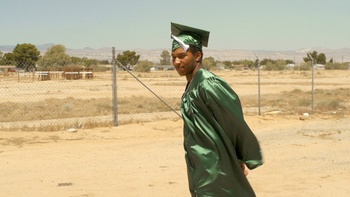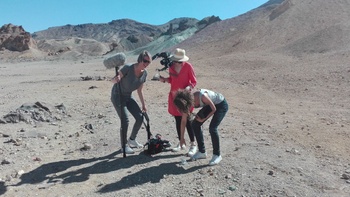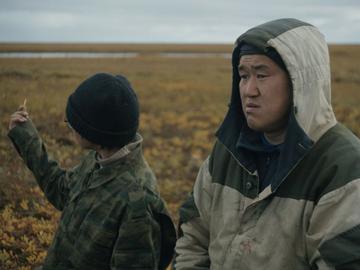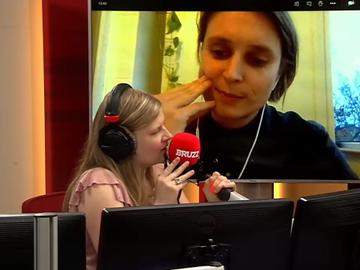Leave it to the Brussels-based trio Sofie Benoot, Liesbeth De Ceulaer, and Isabelle Tollenaere to turn the story of an enormous ghost town in the Southern Californian desert into a poetic, meaningful, triumphant feature-length film: Victoria.

The Berlin Film Festival named Victoria the most innovative and inspiring film in the Forum programme, while the Leuven Docville festival awarded it Best Belgian Documentary. The avant-première at Bozar is sold out, but don't worry because the extraordinary America film by Isabelle Tollenaere and Brussels locals Sofie Benoot and Liesbeth De Ceulaer is opening in Belgian cinemas next Wednesday.
The three directors followed 25-year-old Lashay T. Warren, a young black father who uses his boundless imagination to build a new life for himself in the remarkable desert town California City.
May I ask, by way of introduction, what you do professionally when you are not having cinematic adventures in the Mojave Desert?
Liesbeth De Ceulaer: Just before Victoria, I made Behind the Redwood Curtain. And right now, I am finishing post-production on HOLGUT. That film is about extinction and de-extinction and combines two quests in Siberia: that of a village man and his younger brother from the city and that of a scientist on the tundra.
Isabelle Tollenaere: I make video installations, directed the short film The Remembered Film, and have completed residencies in Shanghai and Paris. I am currently developing a new feature film. PARIS, PARIS is partly set in France and partly in an architectural copy of Paris in a park near Shanghai.
Sofie benoot: I also have my own film projects. In addition, I teach film in the Master's programme at LUCA School of Arts. I am also pursuing doctoral research there. I research cinematic approaches to ecological themes.

From left to right: Liesbeth De Ceulaer, Isabelle Tollenaere, and Sofie Benoot in the South Californian desert.
In other words, you each have your own career. What inspired you to join forces and make a film together?
De Ceulaer: We were already used to working together at LUCA, and we have always continued to do so. We work on each other's films as assistants, photographers, or sound-recorders. It was during Sofie's Desert Haze that the three of us found ourselves in California City. We all thought that fascinating place deserved its own film.
On this film we explored new avenues by directing together instead of alone. That is always interesting. Perhaps it was a touch naïve to tackle the project with three people. You would think that having three directors would make things go faster, but it was actually more work. When you're alone, you can go with your gut feeling, but when there are three of you, you have to convince the others of your ideas. Making decisions was hard work. But don't worry, we're still very good friends. (Laughs)
Perhaps it was a touch naïve to tackle the project with three people
What is California City like? I had honestly never heard of it before.
Tollenaere: That's not surprising. Many people in Los Angeles have never heard of California City either. On the ground, it looks just like small-town America. Nothing special. The city really comes into its own when seen from the air. When you look at satellite images on Google Maps, for example.
In the 1950s, the real estate developer and professor of sociology Nat Mendelsohn wanted to build a second Los Angeles in the desert. In terms of surface area, California City is the third biggest city in California. Thousands of streets and water and electricity mains are just waiting for a massive influx that never came. Just under 12,000 people live there now. You see the occasional house that has been built amidst vacant lots on this enormous street plan. The streets were built with inferior materials and so they are gradually being swallowed up by the desert again. It is not really a ghost town because there are not many vacant buildings. It is just a very empty town with enormous untapped potential. The dream never became reality.
What makes the young Lashay the ideal guide or hero of your film?
Tollenaere: We did not have a predetermined plan. We just started from the place itself. What excited us here? And California City happens to attract people who want to leave their past behind and dream about starting afresh. It is a role the city was born to play. The city was never finished, so it is still in a process of becoming. Lashay personifies the parallel between incomplete city and incomplete person because he left behind a turbulent and violent past in Los Angeles. And, which is at least as important, Lashay is a great person with tremendous charm and a phenomenally poetic power of observation.
The antics of President Trump, the Black Lives Matter movement that seeks to end police violence and racism against black people: America is going through turbulent times. How does Victoria relate to the current situation?
BENOOT: Lashay's situation is a telling example of structural racism in the United States. As a young black person in Los Angeles, he had very few opportunities. He literally distanced himself from that situation by fleeing LA and starting a new life. But that new start is also fraught with a lack of opportunities, and yet he remains hopeful. It is through his hyper-personal story that the film connects to current debates about deeply rooted systemic racism in America.
But Victoria also has a broader view. We look at several layers of American history, such as the great move West of the “pioneers”. You could say that a new myth and identity were created in the Western parts of the United States.
Your previous films also attest to a great fascination with America. Where does it come from?
BENOOT: When I was sixteen, I discovered Cormac McCarthy's books (No Country for Old Men, All the Pretty Horses) and I became fascinated with the western genre. It could be seen as America's creation myth. But the genre is problematic: it was not undiscovered territory at all because there was an indigenous population. But you can hijack the genre's open structure and tell stories within it that look at the world in a different way, and that are inclusive. That is what we have tried to do.
America is a very hard society, but it also exudes a great appeal. The film dives into that black hole. I always want to go back but I would never be able to live there. Liesbeth and I are based in Brussels. I am originally from Bruges and Liesbeth is from Diest, but once we had moved to Brussels there was no way back for us. I now identify more with Brussels than I ever identified with Bruges. Despite the small difference of letters, the mentality here is completely different. I feel more Brussels than I feel Belgian or Flemish.
VICTORIA
BE, dir.: Sofie Benoot, Liesbeth De Ceulaer, Isabelle TollenaereRelease: 4/11Avant-première: 23/10, 19.00 (sold out), Bozar


Fijn dat je wil reageren. Wie reageert, gaat akkoord met onze huisregels. Hoe reageren via Disqus? Een woordje uitleg.